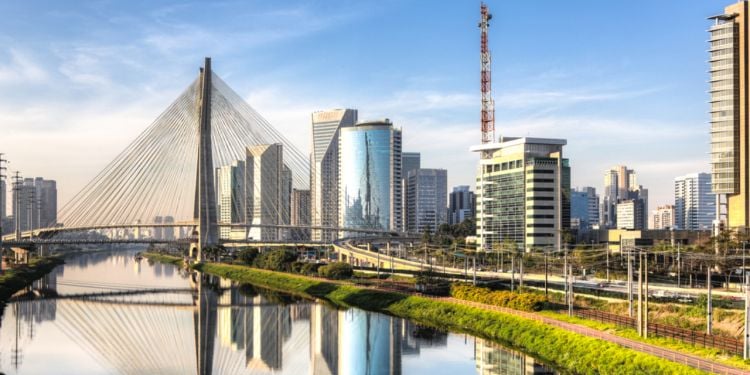
It's better to get a job from abroad if you want to work in Brazil. In this article, find useful information to guide you in your search. To obtain a work visa in Brazil, you're advised to find a job before moving. You may consult job offers from Brazilian economic missions nearest to you or from foreign chambers of commerce operating in Brazil. Moreover, you have to gather concrete information on the labor market and on occupational regulations or on settlement procedures if you want to set up your own business there.
About Brazil
As the sixth-most populated country in the world, Brazil is a huge melting pot. The official language is Portuguese, but many people also speak English, Spanish, German, and French. You'll also find a wide range of ethnicities here, which makes it appealing to expats from all across the globe. In fact, it's one of the most multicultural and ethnically diverse nations.
The economy of Brazil
Brazil's economy has gone through some ups and downs in the last few decades. At first, the country hit its stride in 2009 and enjoyed an economic boom for 5 years. Then, it went through a hard recession that's been tough to recover from. It regained its footing in 2017, where it had the eighth-largest economy in the world. But then the pandemic happened, which sent shockwaves through every nation's economy.
The good news is, Brazil's economy is recovering well. While it's now the twelfth-largest economy in the world, its Gross Domestic Product (GDP) was still $1.44 million in 2020.
Brazil has been slowly expanding its economy and reaching into international markets, both in finances and in commodities. Tourism is rising as a key part of the nation's economy, especially ecotourism. Other areas that make up Brazil's economy include agriculture, mining, and textiles.
Brazil's economy also depends heavily on exports. Its major exports include coffee (the country's been the largest producer for over 150 years), soy, maize, beef, chicken meat, iron ore, tobacco, sugar, orange juice, gold, ethanol, and footwear.
While the nation initially pegged its currency (the real) to the US dollar in 1994, this was changed to a managed float regime temporarily in 1998, and then to a free-float one in 1999.
Do note that corruption is a major detractor in the economy of Brazil. However, it's so prevalent and accepted that not much is done.
Sectors with potential
One of Brazil's strongest industries is agriculture. This country is the largest producer of many agricultural commodities. It's also one of the largest producers of animal proteins globally. Brazil is the second-largest exporter of processed foods as well. In addition, its allied sectors (such as forestry and fishing) made up 5.1% of the GDP in 2007. This makes it a good country to find work in if your specialty is in this field.
There's also a large mining industry in Brazil. Iron ore is mainly extracted here, as well as copper, gold, and some other metals. Brazil's also the largest producer of several precious stones: agate, amethyst, and topaz. Plus, they produce a significant amount of emerald, aquamarine, garnet, and tourmaline. This means the jewelry industry is quite good here.
The largest healthcare cooperative in the world (Unimed) is found right here in Brazil. This company alone makes up 32% of the healthcare insurance market in the nation, so there's good work to be found here.
Other key industries where you can find potential jobs include pulp, footwear, automobile, chemical, and textile.
As we've mentioned earlier, tourism makes up a good part of Brazil's economy. It's the most visited country in South America, and the second in all of Latin America. Tourists come from far and wide to enjoy the country's sun and beaches, so ecotourism is a huge thing here. If you have an interest in Brazil's natural areas, it might be possible to get a job as a tour guide, especially if you speak English or other languages other than Portuguese.
Writing a Brazilian resume
The official language in Brazil is Portuguese, so you'll have to write your resume in this language. You might be lucky and have the opportunity to apply at multinational companies that'll accept English resumes, but for the most part, you'll want to apply in Portuguese, as this will give you a leg up on your competition.
Make sure your resume isn't long-winded. Employers don't want to see anything over 2 pages, so make every word count. You should start with your most recent experiences and jobs, then go in backward chronological order. You should do the same with listing your educational experiences, but leave out your elementary education.
For every job application, you should write a separate custom cover letter. You should convey why you want the job, why you're a good fit, and how you'll be an asset to the company.
Finding work in Brazil
Target the companies and fields that interest you and send your job application, consisting of your resume accompanied by a cover letter. Don't limit yourself to foreign companies so far. You can also contact local businesses.
You'll find a few useful tools below for doing so:
Online avenues
We've just given you some useful tools to find work in Brazil. However, there are many other avenues to choose from, especially when you search digitally.
One valuable resource is LinkedIn. This platform is like Facebook in that it functions like social media, but it's specifically for business purposes. You can add a professional headshot and bio, as well as add your prior experiences and upload your resume.
But the beauty of LinkedIn is employers can list job openings on the site. You can search for specific positions and locations, then get pages of results. Then, you can apply by attaching your uploaded resume and cover letter. You'll then wait to hear back from HR through either the site's inbox or by email. It's also possible to be approached by headhunters, although this is rare. Brazilian companies must prove they've tried to hire native Brazilians before they can hire outside the country, and even then, their workforce must be at least two-thirds native Brazilian. So as you can see, you'll only get approached if you've got a unique skill set they're lacking in Brazil.
You can also try the websites of inter-governmental and multinational firms, as well as your country's embassy website. All of these will have job listings for Brazil, specifically. In addition, the embassy will also have a useful list of international firms, so you can start there and check each one.
Offline avenues
Networking is very powerful, especially regarding overseas positions. If you get in touch with the right people, you might be able to find opportunities that you'd otherwise never hear about. So it's time to start socializing and networking with your Brazilian friends or friends who know Brazilians.
Nowadays, fewer jobs are posted in newspapers, but it still happens. So if you can get your hands on Brazilian newspapers, browse through them to see if there are any relevant job postings. Otherwise, you can check online, as many publications have both offline and online versions of their papers.
You can also consult recruitment agencies, employment agencies, or job websites that can help you find a temporary or permanent job. However, you'll have to pay a fee for these services, which might not feasible for those with a limited budget. But it's a good investment if you can afford it, as you'll have someone in Brazil being proactive about finding you a suitable job.
Things to note
While Brazilian companies must prove they've tried to hire within the country and keep their workforce mainly Brazilian, not all hope's lost here. You might be exempt if you've lived in the country for at least 10 years, are married to a Brazilian citizen, or have a Brazilian-born child.
If you're not exempt, then it can be extremely difficult to find a job and move to Brazil, especially given how the country's economy isn't doing as best as it can.
In this case, it's easier for you to work with a multinational company in your home country first. Then, you can request a transfer to their Brazilian branch. This can save you a lot of time since foreign titles and certificates aren't recognized in Brazil. If you don't work through a multinational company, you'll have to work hard to regain the titles and certificates in Brazil before employers will even consider you.
Also, we mentioned earlier that it's possible to get headhunted through certain avenues. However, always be wary, as there are lots of Brazilian scammers. If you have a mediocre skillset, yet the recruiter is offering you a glamorous job offer, then it's most likely a scam.
Work culture
Before you land a job, you should know about Brazilian work culture. That way, you won't be too shocked when you go in for your first day.
In general, the work culture in Brazil is much like the work culture in most Western countries. The workplace is hierarchical, so you'll see that everyone has defined roles where no one steps on anyone else's toes by crossing boundaries.
If you're looking at corporate roles and workplaces, then you're in luck if you speak English. Most people here should have a basic understanding of the language, so you won't be stuck with just Portuguese. This is especially true if your office is on the younger side, as in more recent years, Brazilian education has strived to teach more English to students.
As for the dress code, expect to dress professionally. This might not be true in all workplaces, but for the most part, you'll have to dress to the nines. How you present yourself is essential in Brazilian culture, so if you dress immaculately and stylishly, you won't have a tough time.
Much to expats' surprise, punctuality isn't very important in Brazil, even in the workplace. You'll typically see people arrive 10 to 20 minutes late to a meeting, so if you've arrived on time and are wondering what's taking your colleagues so long, it's probably nothing. Don't be tempted to join in Brazilian tardiness, as it still leaves a good impression if you're on time for your meetings. Just don't have high expectations that others will do the same.
Another key thing to note is that interpersonal relationships are important. If you're used to going to work and coming home barely having a relationship with your coworkers, then prepare for things to change. You'll want to make an effort to get to know the people you work with. You should also hug them when you greet them in the morning. And if you're a woman, and/or you're greeting a woman, you'll exchange two kisses on each cheek, so be prepared.
The further north you go, the more informal Brazilians are. Knowing this, you might want to pick a city to live in and work in accordingly.
Living in Brazil
Living in Brazil is pleasant, as the climate is tropical. Major cities that expats like settling in include Salvador de Bahia, São Paulo, Recife, Brasilia, Fortaleza, Curitiba, Belo Horizonte, and Rio de Janeiro. Each city has its pros and cons, so to find out more about them, you should read Expat.com's articles on finding accommodations in these cities.
No matter where you go, you'll find that most people live in apartment blocks. These are safer than detached homes, which you'll find in more rural areas. Apartment blocks will come with doormen (or porteiros), which upgrades security.
If you enjoy a vibrant nightlife, then you'll like living in Brazil. Many of the large cities (especially the ones we've listed) have great bars with live music where you can spend many evenings enjoying yourself with friends.
Social butterflies will also feel right at home in Brazil. Brazilians are very warm and friendly, and it's not uncommon to see them make small talk with strangers. It'll be a great way to learn Portuguese if you're not fluent or a native speaker.
Useful links:
We do our best to provide accurate and up to date information. However, if you have noticed any inaccuracies in this article, please let us know in the comments section below.








